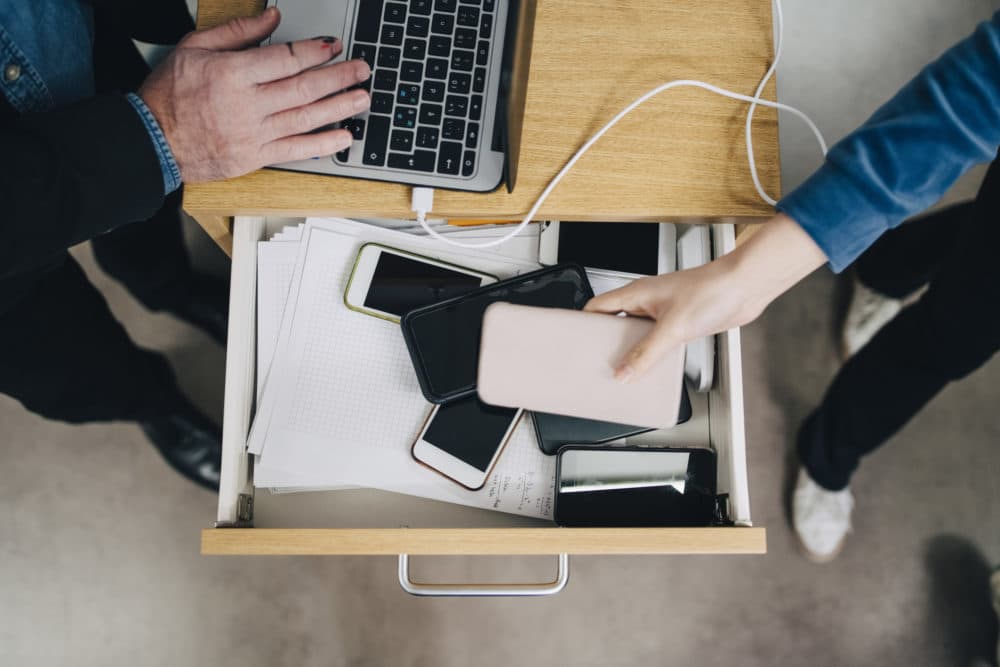Advertisement
Commentary
Welcome back to school — now, please put down your phone

As I greet my high school students this first month back, I expect their faces will look more rested, their skin more sun-kissed and, if I’m lucky, their willingness to laugh at my jokes will be more generous than when we last met in the spring during final exams.
One joke they readily indulge is the idea of “phone jail.” Like many educators, I keep a tight leash on technology in my classroom and will occasionally make cracks — like asking if students’ organ donors are calling — since the matter on their pocket-sized screen seems so urgent.
To be sure, plenty of students use their phones and laptops wisely and can by and large govern the time they spend playing “League of Legends” so that their school work and relationships do not suffer. Yet whether it’s my own teenage children at home or my students in the classroom, I find I must reel them back into the human circle daily, as they appear lost somewhere in the ether of the internet. More and more, when I ask my kids to remove their earbuds at the beginning of class, many of them counter, “But the sound is off.” The message they send with their plugged ears would imply a resistance to any sound entering, however, whether from their teacher, parent or peers.
The pervasive distraction of technology is nothing new — not to the classroom or the board room or the dining room table. But too often the abiding concern when it comes to teenagers and technology tends to raise questions like “how much time?” or “which devices?” and “what age is best?” What if we ask instead, how can we help normalize the discomfort that comes with being human, as something from which we can’t simply escape?
After all, being a teenage human is wildly uncomfortable, even for the most well-adjusted. All teenagers possess a brain still under construction. Their hormones and relationships are often waxing and waning, their lives’ trajectories often murky at best. The allure of TikTok — with its capsule-sized video answers when so many questions loom large — is understandable. Attempting to tune out the din of gossip with one’s AirPods is a valiant coping strategy. The danger lies in how much of our young people’s lives are spent not coping, perhaps not even aware of the ways in which the devices they turn to for escape can make matters worse.
In recent years, teachers have widely reported disruptions in class — not because a student is distressed about a grade or an upcoming hockey game, but because they cannot emotionally regulate after receiving an upsetting revelation through Snapchat. The channel they sought to help them desensitize or disconnect from reality betrayed them and left them feeling even more overstimulated. Passing time with Instagram or “Call of Duty” may be purchased relief, and may only delay or even amplify whatever they’re going through in real life.
Advertisement
After all, being a teenage human is wildly uncomfortable, even for the most well-adjusted. All teenagers possess a brain still under construction.
Of course, I cannot overlook the fact that all of my students have lived through a pandemic in which technology was a lifeline to friends, to school — an opportunity to feel more human in spurts. I, too, was grateful for the bridge it offered.
But while research tells us nine out of 10 cellphone-using teens use them “to just pass time,” more compelling to me as a teacher is the statistic that 56% of teens associate being without their phone with at least one of three emotions: loneliness, being upset or feeling anxious.
With this in mind, I’ll occasionally back-burner a lecture on “Macbeth” or a quiz on passive voice in favor of active breathing. A pause for “midweek mindfulness” is sometimes met with reluctance by a room full of ninth graders, but I want to normalize feeling anxious, as well as healthy ways to cope with it.
While I recognize the ways in which I’m competing with technology for my students’ attention, I hope our classroom can be a space where we make room for raggedy feelings and inconvenient emotions, and where we may all be enriched. I hope our experience together amounts to more than passing the time.
